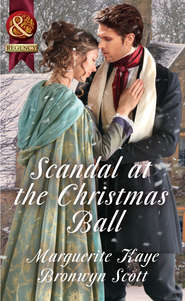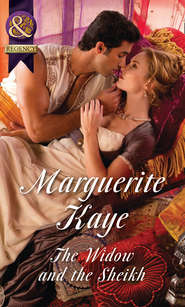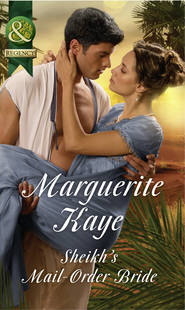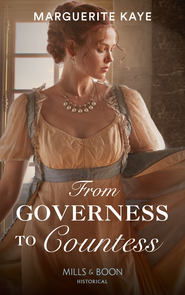По всем вопросам обращайтесь на: info@litportal.ru
(©) 2003-2024.
✖
The Highlander's Redemption
Настройки чтения
Размер шрифта
Высота строк
Поля
The Highlander's Redemption
Marguerite Kaye
RELUCTANT SAVIOUR… WILLING SEDUCER On her first night in Scotland, Madeleine Lafayette is rescued from danger by brooding Highlander Calumn Munro… Why Calumn agrees to take Madeleine under his protection, he doesn’t know – the unconquerable demons of his warrior past are burden enough without adding the demands of one bewitchingly brave Frenchwoman!Yet her innocence soothes the jagged edges of his soul, and her beauty fires his blood… He might be her reluctant saviour, but he’ll be her willing seducer…Highland Brides Warriors take a wife!
‘You, Madeleine Lafayette, are a captivating wee witch.’
‘I am not a witch,’ Madeleine said, flustered and indignant. She could feel the heat of his body, though they were hardly touching.
‘No? Maybe a fairy, then,’ Calumn said, wondering fancifully if she had indeed cast a spell on him. Mere foolishness—but he hadn’t come across her like before, and he didn’t seem to be able to make himself stop what he knew he shouldn’t be doing. For he wanted suddenly, urgently, to kiss her. He leaned closer and caught a trace of her scent, remembered that too, from last night, like the wisps of a dream.
‘What are you doing? Let me go.’ Madeleine’s lungs seemed to have stopped working. Her heart was pumping too hard. Calumn’s eyes sparkled blue like the summer sea. He looked as if he was going to kiss her. Surely he would not dare? Surely she would not …?
Calumn kissed her. It was the softest of kisses, just a touch of his lips on hers. A warmth, a taste, a curl of pleasure inside her, and it was over. ‘Oh! You should not …’
AUTHOR NOTE
In the eighteenth century it was relatively common for young Scotsmen like Calumn, the hero of my story, to join the British army as part of their education—just as the sons of English noblemen were accustomed to do. Prior to the ‘45 Rebellion there was little conflict between the British Government and the Highland clan system, since both operated almost independently.
The Young Pretender changed all of this. Contrary to popular myth, the Jacobite uprising wasn’t a case of Highlanders led by Bonnie Prince Charlie fighting an English army. It was a much more complex and far more harrowing scenario than that.
The forces of the Crown, led ultimately by the King’s brother, the Duke of Cumberland, were made up from the regular army, supplemented by a number of clans loyal to the King (mostly but not exclusively Presbyterian, including my local clan, the Campbells of Argyll), who did not want to see the Catholic Stuarts on the throne. Though efforts were initially made to keep Highland regiments out of the fighting, by the time of Culloden there were four Scottish regiments involved. Ranged against them, the Jacobite army comprised a mixture of Highland clans (largely Catholic and Episcopalian), lowland recruits, plus French, Irish and even some English volunteers and mercenaries. Kin faced kin across the battlefield, just as Calumn finds himself doing.
Following the defeat of the Jacobites, the feudal power of the clans was systematically removed and the landscape of the Highlands changed for ever, regardless of whether the laird had supported the Government, as Calumn’s father did, or Bonnie Prince Charlie.
Charles Edward Stuart fled to France from where, having become an embarrassment to the French court, he was packed off to Switzerland. He eventually died in Italy, reputedly of drink. He never returned to Scotland.
The retribution which followed Culloden—the disarming of the clans and the ban on Highland dress, the confiscation of lands, the burning of crofts and the decimation of the population (commonly known as the Clearances)—which is depicted in my story—is entirely factual. ‘Butcher’ Cumberland’s nickname, and reputation, was well earned.
About the Author
Born and educated in Scotland, MARGUERITE KAYE originally qualified as a lawyer but chose not to practise—a decision which was a relief both to her and to the Scottish legal establishment. While carving out a successful career in IT, she occupied herself with her twin passions of studying history and reading, picking up first-class honours and a Masters degree along the way.
The course of her life changed dramatically when she found her soul mate. After an idyllic year out, spent travelling round the Mediterranean, Marguerite decided to take the plunge and pursue her life-long ambition to write for a living—a dream she had cherished ever since winning a national poetry competition at the age of nine.
Just like one of her fictional heroines, Marguerite’s fantasy has become reality. She has published history and travel articles, as well as short stories, but romances are her passion. Marguerite describes Georgette Heyer and Doris Day as her biggest early influences, and her partner as her inspiration.
Marguerite would love to hear from you. You can contact her at: Marguerite_Kaye@hotmail.co.uk
Previous novels by the same author:
THE WICKED LORD RASENBY
THE RAKE AND THE HEIRESS
INNOCENT IN THE SHEIKH’S HAREM
(part of Summer Sheikhs anthology) THE GOVERNESS AND THE SHEIKH
and in Mills & Boon
HistoricalUndone!eBooks:
THE CAPTAIN’S WICKED WAGER
THE HIGHLANDER AND THE SEA SIREN
BITTEN BY DESIRE TEMPTATION IS THE NIGHT
The Highlander’s Redemption
Marguerite Kaye
www.millsandboon.co.uk (http://www.millsandboon.co.uk)
For Johanna, Catriona and Fiona, who amazingly claimed to be flattered to have a lochan named after them!
Prologue
The wind ripped mercilessly across the bleak, rolling moorland, driving the icy sleet straight into the grimly set faces of the Jacobite forces ranged opposite. Calumn peered through the haze of smoke at the ragged Highland line in a desperate attempt to make out the Macleod colours, but it was useless. There was no doubt Rory was among them somewhere. Best not to know exactly where.
The big three-inch guns pounded across the narrow gap which constituted no-man’s land. The air was acrid with the stink of gunpowder. Calumn’s ears rang with the noise—the tumultuous blast of artillery, the drums, the snorting and whinnying of the Dragoons’ horses stationed on the left flank. And above it all the eerie banshee wail of the wind.
He readied his company of fusiliers for battle, rousing the men, straightening the line, barking lastminute orders. His heart was pounding so hard he could hear it even above the thud, thud, thud of the guns. He was afraid, but not of death. He cared not a jot for his own life, but he was terrified none the less. Terrified that he would look up in the heat of battle and come face to face with his brother.
A spine-tingling roar, starting low and rising to a crescendo, as if from the maw of a thousand lions, carried across the moor from the Jacobites. A fearsome, chaotic line of Highlanders, standards flying, began to charge. Calumn automatically checked the fixing on his bayonet. Saw Cumberland give the signal. Gave his own company the nod. And slowly, inexorably, moved forward into the hellish fray.
A shot whistled past his ear. Traitor, traitor, the voice in his head sang out, yet onwards he went, step after disciplined step, towards the heaving mass of wild-eyed clansmen in their plaids. His feet sank into the brackish water of a burn. The wounded screamed, crumpling beside and in front of him. The ferrous smell of fresh blood rent the air, mingling with the heart-wrenchingly familiar scent of sodden wool coming from the filleadh begs worn by the Highlanders. With leaden arms, he raised his musket, aimed and fired. High. Mutinously high. Far above the heads of the men who were his kin.
A riderless horse bolted, the high-pitched whinny like the scream of a frightened child. He saw the Macleod colours directly in front of him and paused, frantically searching, seeking Rory’s distinctive mane of gold hair, the exact same colour as his own. A hissing noise, which he thought at first was the wind changing direction, made him look up just in time to see the murderous glint of metal arc through the air towards him. In time to turn away from its fatal path, but not in time to avoid it completely. The heavy, double-bladed claymore sliced into the flesh of his belly, the force of the impact sending him flying backwards into his own line. Finally, he saw Rory. As he cried out his brother’s name, his legs gave way beneath him and he felt himself falling, falling, falling …
Calumn woke with a start as he always did, sweating profusely. The dryness of his mouth told him he had been shouting in his sleep. Trembling, like a man with the ague, he reached for the decanter of whisky he had taken to keeping on the nightstand by his bed, gulping down a generous dram of the fiery golden liquid. He touched the large scar, which weaved a jagged path across the taut muscles of his abdomen. The physical wound had long since healed, but on nights like this the scar felt burning hot, inflamed and aching, as though he had been branded by an iron.
Eventually the vivid memory of the nightmare faded. Calumn slumped back against the damp pillows, clutching his glass. The furious beating of his heart slowed. The sheen of sweat on his chest dried.
But other, less visible scars still burned, deep in his psyche. The all-pervading sense of desolation. And the heavy blanket of guilt which enveloped his soul.
Chapter One
Edinburgh—July 1747
Madeleine Lafayette huddled forlornly in the entranceway of a close, the narrow passageway leading to the tenements which Edinburgh’s residents called home. Even in the dim glow cast by the flare of the nearby brazier which served as a street light, it would have been obvious to any passer-by that the young woman was no native Scot. Her slim figure was clad in garments of a decidedly foreign cut, the dark blue tippet she clutched around her shoulders woven in an intricate design that was neither plaid nor stripe. Her flaxen hair showed almost white in the ghostly light, but her skin had neither the pallor of the city dweller nor the swarthiness of the Gael. Rather it was translucent, like a pearl tinged with colour by the sun. With a generous mouth, the soft pink of coral, and slanting green eyes under fair brows, she had the appearance, against the grey of the city’s sandstone and granite, of an exotic sea-creature out of her element.
Shivering, Madeleine hugged her tippet closer. At the top of Castlehill she could see the dark hulk of the castle looming, forbidding and—as she had discovered to her dismay—impregnable. Perhaps it had been a mistake, coming all this way alone with no contacts and no plan, nothing save the one objective in her mind. To find Guillaume.
The exhilaration of her impetuous flight and the trials of the rough sea voyage with the Breton fishermen had prevented her from thinking too much about the danger she was courting in coming here alone, the overwhelming odds which were stacked against her, or the terrifying possibility that despite all her certainty she was wrong. That Guillaume really was dead.
No! He was alive. He must be alive.
Above her, from the castle ramparts, someone barked out a staccato order. Footsteps rang out over the cobblestones as another rushed to obey, then silence descended again.
Marguerite Kaye
RELUCTANT SAVIOUR… WILLING SEDUCER On her first night in Scotland, Madeleine Lafayette is rescued from danger by brooding Highlander Calumn Munro… Why Calumn agrees to take Madeleine under his protection, he doesn’t know – the unconquerable demons of his warrior past are burden enough without adding the demands of one bewitchingly brave Frenchwoman!Yet her innocence soothes the jagged edges of his soul, and her beauty fires his blood… He might be her reluctant saviour, but he’ll be her willing seducer…Highland Brides Warriors take a wife!
‘You, Madeleine Lafayette, are a captivating wee witch.’
‘I am not a witch,’ Madeleine said, flustered and indignant. She could feel the heat of his body, though they were hardly touching.
‘No? Maybe a fairy, then,’ Calumn said, wondering fancifully if she had indeed cast a spell on him. Mere foolishness—but he hadn’t come across her like before, and he didn’t seem to be able to make himself stop what he knew he shouldn’t be doing. For he wanted suddenly, urgently, to kiss her. He leaned closer and caught a trace of her scent, remembered that too, from last night, like the wisps of a dream.
‘What are you doing? Let me go.’ Madeleine’s lungs seemed to have stopped working. Her heart was pumping too hard. Calumn’s eyes sparkled blue like the summer sea. He looked as if he was going to kiss her. Surely he would not dare? Surely she would not …?
Calumn kissed her. It was the softest of kisses, just a touch of his lips on hers. A warmth, a taste, a curl of pleasure inside her, and it was over. ‘Oh! You should not …’
AUTHOR NOTE
In the eighteenth century it was relatively common for young Scotsmen like Calumn, the hero of my story, to join the British army as part of their education—just as the sons of English noblemen were accustomed to do. Prior to the ‘45 Rebellion there was little conflict between the British Government and the Highland clan system, since both operated almost independently.
The Young Pretender changed all of this. Contrary to popular myth, the Jacobite uprising wasn’t a case of Highlanders led by Bonnie Prince Charlie fighting an English army. It was a much more complex and far more harrowing scenario than that.
The forces of the Crown, led ultimately by the King’s brother, the Duke of Cumberland, were made up from the regular army, supplemented by a number of clans loyal to the King (mostly but not exclusively Presbyterian, including my local clan, the Campbells of Argyll), who did not want to see the Catholic Stuarts on the throne. Though efforts were initially made to keep Highland regiments out of the fighting, by the time of Culloden there were four Scottish regiments involved. Ranged against them, the Jacobite army comprised a mixture of Highland clans (largely Catholic and Episcopalian), lowland recruits, plus French, Irish and even some English volunteers and mercenaries. Kin faced kin across the battlefield, just as Calumn finds himself doing.
Following the defeat of the Jacobites, the feudal power of the clans was systematically removed and the landscape of the Highlands changed for ever, regardless of whether the laird had supported the Government, as Calumn’s father did, or Bonnie Prince Charlie.
Charles Edward Stuart fled to France from where, having become an embarrassment to the French court, he was packed off to Switzerland. He eventually died in Italy, reputedly of drink. He never returned to Scotland.
The retribution which followed Culloden—the disarming of the clans and the ban on Highland dress, the confiscation of lands, the burning of crofts and the decimation of the population (commonly known as the Clearances)—which is depicted in my story—is entirely factual. ‘Butcher’ Cumberland’s nickname, and reputation, was well earned.
About the Author
Born and educated in Scotland, MARGUERITE KAYE originally qualified as a lawyer but chose not to practise—a decision which was a relief both to her and to the Scottish legal establishment. While carving out a successful career in IT, she occupied herself with her twin passions of studying history and reading, picking up first-class honours and a Masters degree along the way.
The course of her life changed dramatically when she found her soul mate. After an idyllic year out, spent travelling round the Mediterranean, Marguerite decided to take the plunge and pursue her life-long ambition to write for a living—a dream she had cherished ever since winning a national poetry competition at the age of nine.
Just like one of her fictional heroines, Marguerite’s fantasy has become reality. She has published history and travel articles, as well as short stories, but romances are her passion. Marguerite describes Georgette Heyer and Doris Day as her biggest early influences, and her partner as her inspiration.
Marguerite would love to hear from you. You can contact her at: Marguerite_Kaye@hotmail.co.uk
Previous novels by the same author:
THE WICKED LORD RASENBY
THE RAKE AND THE HEIRESS
INNOCENT IN THE SHEIKH’S HAREM
(part of Summer Sheikhs anthology) THE GOVERNESS AND THE SHEIKH
and in Mills & Boon
HistoricalUndone!eBooks:
THE CAPTAIN’S WICKED WAGER
THE HIGHLANDER AND THE SEA SIREN
BITTEN BY DESIRE TEMPTATION IS THE NIGHT
The Highlander’s Redemption
Marguerite Kaye
www.millsandboon.co.uk (http://www.millsandboon.co.uk)
For Johanna, Catriona and Fiona, who amazingly claimed to be flattered to have a lochan named after them!
Prologue
The wind ripped mercilessly across the bleak, rolling moorland, driving the icy sleet straight into the grimly set faces of the Jacobite forces ranged opposite. Calumn peered through the haze of smoke at the ragged Highland line in a desperate attempt to make out the Macleod colours, but it was useless. There was no doubt Rory was among them somewhere. Best not to know exactly where.
The big three-inch guns pounded across the narrow gap which constituted no-man’s land. The air was acrid with the stink of gunpowder. Calumn’s ears rang with the noise—the tumultuous blast of artillery, the drums, the snorting and whinnying of the Dragoons’ horses stationed on the left flank. And above it all the eerie banshee wail of the wind.
He readied his company of fusiliers for battle, rousing the men, straightening the line, barking lastminute orders. His heart was pounding so hard he could hear it even above the thud, thud, thud of the guns. He was afraid, but not of death. He cared not a jot for his own life, but he was terrified none the less. Terrified that he would look up in the heat of battle and come face to face with his brother.
A spine-tingling roar, starting low and rising to a crescendo, as if from the maw of a thousand lions, carried across the moor from the Jacobites. A fearsome, chaotic line of Highlanders, standards flying, began to charge. Calumn automatically checked the fixing on his bayonet. Saw Cumberland give the signal. Gave his own company the nod. And slowly, inexorably, moved forward into the hellish fray.
A shot whistled past his ear. Traitor, traitor, the voice in his head sang out, yet onwards he went, step after disciplined step, towards the heaving mass of wild-eyed clansmen in their plaids. His feet sank into the brackish water of a burn. The wounded screamed, crumpling beside and in front of him. The ferrous smell of fresh blood rent the air, mingling with the heart-wrenchingly familiar scent of sodden wool coming from the filleadh begs worn by the Highlanders. With leaden arms, he raised his musket, aimed and fired. High. Mutinously high. Far above the heads of the men who were his kin.
A riderless horse bolted, the high-pitched whinny like the scream of a frightened child. He saw the Macleod colours directly in front of him and paused, frantically searching, seeking Rory’s distinctive mane of gold hair, the exact same colour as his own. A hissing noise, which he thought at first was the wind changing direction, made him look up just in time to see the murderous glint of metal arc through the air towards him. In time to turn away from its fatal path, but not in time to avoid it completely. The heavy, double-bladed claymore sliced into the flesh of his belly, the force of the impact sending him flying backwards into his own line. Finally, he saw Rory. As he cried out his brother’s name, his legs gave way beneath him and he felt himself falling, falling, falling …
Calumn woke with a start as he always did, sweating profusely. The dryness of his mouth told him he had been shouting in his sleep. Trembling, like a man with the ague, he reached for the decanter of whisky he had taken to keeping on the nightstand by his bed, gulping down a generous dram of the fiery golden liquid. He touched the large scar, which weaved a jagged path across the taut muscles of his abdomen. The physical wound had long since healed, but on nights like this the scar felt burning hot, inflamed and aching, as though he had been branded by an iron.
Eventually the vivid memory of the nightmare faded. Calumn slumped back against the damp pillows, clutching his glass. The furious beating of his heart slowed. The sheen of sweat on his chest dried.
But other, less visible scars still burned, deep in his psyche. The all-pervading sense of desolation. And the heavy blanket of guilt which enveloped his soul.
Chapter One
Edinburgh—July 1747
Madeleine Lafayette huddled forlornly in the entranceway of a close, the narrow passageway leading to the tenements which Edinburgh’s residents called home. Even in the dim glow cast by the flare of the nearby brazier which served as a street light, it would have been obvious to any passer-by that the young woman was no native Scot. Her slim figure was clad in garments of a decidedly foreign cut, the dark blue tippet she clutched around her shoulders woven in an intricate design that was neither plaid nor stripe. Her flaxen hair showed almost white in the ghostly light, but her skin had neither the pallor of the city dweller nor the swarthiness of the Gael. Rather it was translucent, like a pearl tinged with colour by the sun. With a generous mouth, the soft pink of coral, and slanting green eyes under fair brows, she had the appearance, against the grey of the city’s sandstone and granite, of an exotic sea-creature out of her element.
Shivering, Madeleine hugged her tippet closer. At the top of Castlehill she could see the dark hulk of the castle looming, forbidding and—as she had discovered to her dismay—impregnable. Perhaps it had been a mistake, coming all this way alone with no contacts and no plan, nothing save the one objective in her mind. To find Guillaume.
The exhilaration of her impetuous flight and the trials of the rough sea voyage with the Breton fishermen had prevented her from thinking too much about the danger she was courting in coming here alone, the overwhelming odds which were stacked against her, or the terrifying possibility that despite all her certainty she was wrong. That Guillaume really was dead.
No! He was alive. He must be alive.
Above her, from the castle ramparts, someone barked out a staccato order. Footsteps rang out over the cobblestones as another rushed to obey, then silence descended again.











